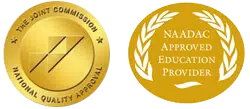Many people find that a 12-step program, pioneered by Bill Wilson as “Alcoholics Anonymous,” can help them remain sober. Narcotics Anonymous, or NA, is a program modeled after that.
The 12 steps of NA are intended to help addicts remain sober, connect to others on a sober path, and explore their reasons for using. Some of the steps can help addicts build back damaged relationships with others, while other steps are intended to help the addict develop a stronger sense of self.
Step 1
We admitted we were powerless over our addiction, that our lives had become unmanageable.
This step helps addicts acknowledge the power of addiction and the effect that drug use has had on their career, family, relationships, and health.
Step 2
We came to believe that a Power greater than ourselves could restore us to sanity.
While some people in NA believe that the Higher Power in this step is God, others may opt for a different Power. Some people, for example, may call the NA community a higher power. This step helps people center on something bigger than themselves for stability.
Step 3
We made a decision to turn our will and our lives over to the care of God as we understood Him.
Again, the God in this step may be the God of the individual’s own religion or may be a representation of the Higher Power in Step 2.
Step 4
We made a searching and fearless moral inventory of ourselves.
This step may be challenging for many people in early recovery, but it can be very important to lasting sobriety. With an honest self-assessment, many people may discover that the person they were in active addiction isn’t the person they want to become.
Step 5
We admitted to God, to ourselves, and to another human being the exact nature of our wrongs.
Confession of the wrongs that people have done while in active addiction can help them reinforce the self-discovery they completed in Step 4. Often, the other human being mentioned is their sponsor. However, it just should be someone they trust.
Step 6
We were entirely ready to have God remove all these defects of character.
This step addresses the individual’s commitment to being a new person and becoming someone who isn’t using drugs to hide the shame from wrongs that they’ve committed.
Step 7
We humbly asked Him to remove our shortcomings.
This step reinforces the individual’s need for support and stability from a Higher Power and reinforces Step 1, that the addiction has made them powerless and in need of help.
Step 8
We made a list of all persons we had harmed, and became willing to make amends to them all.
In Step 8, the addict acknowledges specific ways they wronged others while in addiction. Perhaps they stole from someone or lashed out in anger. Understanding how their behavior affected others is important in reinforcing sobriety.
Step 9
We made direct amends to such people wherever possible, except when to do so would injure them or others.
This step allows the individual to repair relationships with those they harmed or perhaps make restitution for property they may have damaged or stolen.
Step 10
We continued to take personal inventory and when we were wrong promptly admitted it.
Step 10 helps individuals remain accountable for themselves and their behavior and encourages them to live an authentic life.
Step 11
We sought through prayer and meditation to improve our conscious contact with God as we understood Him, praying only for knowledge of His will for us and the power to carry that out.
For those who have a God or other spiritual mentor, this step builds a relationship with them and allows for meditation and reliance on the help of a higher power to stay sober.
Step 12
Having had a spiritual awakening as the result of these steps, we tried to carry this message to addicts and to practice these principles in all our affairs.
The final step builds community within the individual’s home group and between others along the same 12-step path toward sobriety.
Do You Need Treatment?
If you or a loved one is struggling with alcohol or drug addiction, we can help. Contact Baystate Recovery Center today for a confidential consultation.
Baystate Recovery Center, a clinically Infused 12-Step Treatment Center for Drug and Alcohol Addiction, was founded by two partners in addiction treatment services, John Checchi and Michael Wilson.



